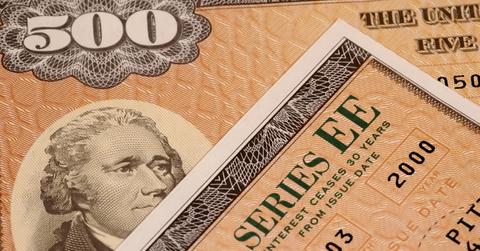What Are Savings Bonds and How Do They Work?
You can buy savings bonds as gift for a loved one or to save for college education funds for kids.
Nov. 16 2020, Published 8:16 a.m. ET

What are savings bonds? They are debt securities issued by the federal government to raise money to fund its spending. Savings bonds are among the safest investments available to retail investors. The bonds earn interest and protect your savings from inflation. The longer you hold a savings bond, the more the benefits accrue. How do you cash a savings bond? What are the tax implications of investing in savings bonds?

First, you may invest in savings bonds to supplement a retirement income, save for a college fund, or buy as a gift for a loved one. Savings bonds are available in electronic and paper forms. You can purchase a savings bond for as little as $25 to as much as $10,000.
How do you cash savings bonds?
To cash electronic savings bonds held in TreasuryDirect, log into your account and follow the instructions provided there. If you redeem an electronic bond, the cash can be credited to your savings or checking account in two days. For a paper bond, the easiest and quickest way to cash it is through a local bank.
How do you check what a savings bond is worth?
Savings bond interest is calculated based on both fixed and inflation rates. If you’ve held the bonds for a while, you may want to find out what your bonds are worth now. There are several ways you can check your savings bond’s current value.
For an electronic bond held in TreasuryDirect, you can check the bond’s current worth by going to the Current Holdings tab in your account. If you have a paper savings bond, you can check its current value using the TreasuryDirect savings bond calculator. The calculator uses the bond’s denomination, serial number, and issue date to work out its current value.
Is there a limit on how much you can cash?
You can cash a minimum of $25 of electronic saving bonds in a single transaction. If you’re making a partial cash out, you have to leave at least $25 in your account. For paper bonds, there isn't a limit on how much you can cash in a single transaction.
Do all banks cash savings bonds?
When cashing a paper bond at a local bank, keep in mind that some banks may have a policy that they don’t accept savings bonds. Also, even banks that will cash savings bonds may have policies about how much they will cash in a single transaction.
What do you need to cash a savings bond?
To cash paper bonds through Treasury Retail Securities Services, you will need to complete FS Form 1522. Mail the bonds and the completed FS Form 1522 to Treasury Retail Securities Services at PO Box 214, Minneapolis, MN 55480-0214.

If you plan to cash your bonds at a local bank, check if the bank accepts savings bonds. Also, find out the bank’s bond cashing limits and the identification needed. If you take the bonds to the bank where you have an account, you may need simple identification like a driver’s license.
If you plan to cash bonds that don’t list you as the owner or co-owner, you will need to submit documents that approve that you are entitled to cash the bond. You may want to cash bonds that don’t bear your name if you inherited them after the bond owner died. However, you can’t cash bonds that belong to another person or bonds bought on an online auction site.
Do you have to claim savings bonds on taxes?
The interest earned on a savings bond is subject to federal income tax. However, you may not pay tax on savings bond interest if you use the money for higher education. When you cash a savings bond, you will get a form to report the taxes.
The IRS issues Form 1099-INT for all cashed bonds. When you cash electronic bonds, you will be able to access the tax form on the ManageDirect page of TreasuryDirect. For paper bonds, the local bank where you cash the bond will give you tax form 1099-INT. Keep in mind that the bank may issue the form immediately or mail it to you later.
